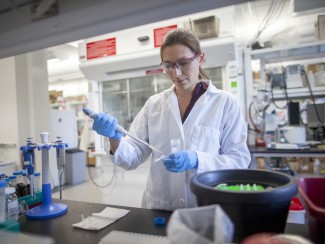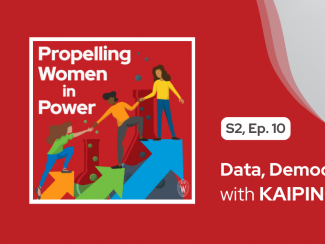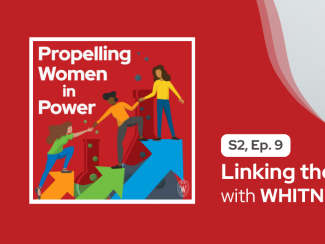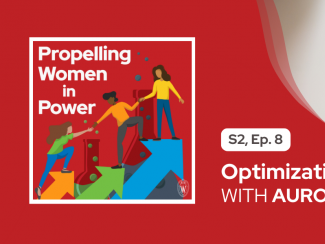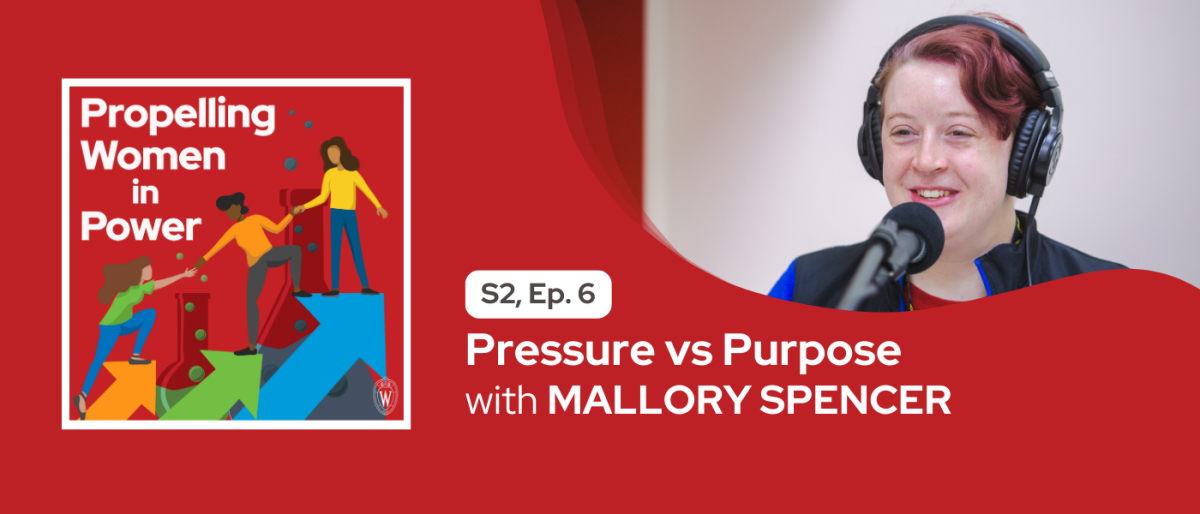
In today's episode, Mallory Spencer, graduate student in the Thomas Lab at UW–Madison, takes us on her journey through STEM, how her undergraduate internship at the Great Lakes Bioenergy Research Center sparked her passion for exploring the bioproduct-making potential of microbes, leading her to pursue a Masters Degree in Bacteriology.
Mallory shares with us the pressures she felt to pursue a PhD, and how after reevaluating her career aspirations, she chose a Master's instead. She enlightens us with her personal experiences navigating STEM as a woman, reflections on purpose, and the need for accountability and accommodations in academia.
Listen on Spotify, Apple Podcasts, Google Podcasts, Youtube, anywhere you can find podcasts or listen below!
Transcript
Michelle Chung: Hey, Meg, have you ever thought about getting a Ph.D.?
Meg Riker: I have. My mom is a professor and she has her Ph.D., so I used to see it as a natural progression, getting a Ph.D., But in college, I struggled to get through the pandemic, and I started doing this podcast to get a bunch of the perspectives on how to move forward career wise, because to me, she really is a career choice.
And ultimately I decided it was not the right choice for me right now.
Michelle Chung: Yeah, we do often think that a Ph.D. is the prescribed path in academia, but there's so many alternatives to that. Today's guest, Mallory Spencer, a graduate student in the Thomas Lab at UW Madison, went through that exact realization where she realized a Ph.D. wasn't the right choice for her and how that made her reevaluate what she actually wanted.
Working toward her master's in bacteriology. Mallory researches the ins and outs of bacterial metabolism, where she's looking at how bacteria transform different molecules into chemicals that can be used to make biofuels or bioproducts. And in today's episode, she will share what she's learned in her time in grad school. Her thoughts on how to be a better ally, and what she hopes to see in terms of accountability in academia.
Meg Riker: From the Wisconsin Energy Institute and the Great Lakes Bioenergy Research Center. I'm Meg.
Michelle Chung: And I'm Michelle.
Meg Riker: And you're listening to Propelling Women in Power, a podcast about the careers of women in energy at the Wisconsin Energy Institute on the UW Madison campus, and our sister institution, the Great Lakes Bioenergy Research Center.
Michelle Chung: Let's dive in with Mallory Spencer.
Mallory Spencer: My name is Mallory Spencer. I use she her pronouns and I am a master's student in Professor Michael Thomas's lab.
Michelle Chung: How did you get into this field of microbiology? How did you get your start into that interest?
Mallory Spencer: Well, I've known for a while that I wanted to do microbiology research generally, but I wasn't sure what kind of microbiology research I wanted to do, So I took some research opportunities in undergrad. And mostly this involved applying to different summer internships across the country through the National Science Foundation. So I applied to these internships across the country, and UW Madison was one that accepted me.
And so I actually got into a professor, Ophelia Venturelli's lab here at UW, and I started doing bioenergy research and actually some natural product synthesis as well. And for that project, I was trying to engineer Lactobacillus to make another platform, chemical lactate esters. So that really caught my interest. And I actually learned a lot more about bioenergy and related fields through that research experience.
Like we went to Kellogg Biological Station in Michigan. Yeah. And so we learned a lot about more research there as well. And I was funded by the Great Lakes Bioenergy Research Center. That summer, I wanted to continue my research in bioenergy or a related field, and I got into UW Madison for my master's program, and Professor Michael Thomas accepted me into his lab.
Michelle Chung: So you went to that first research experience where you were in Ophelia Venturelli's lab. Did you have, like, a mentor that led you on your research path that started from there?
Mallory Spencer: I've had a couple of mentors that really helped me with my research path. So in Ophelia Venturelli's lab, I worked with a post-doc, Dr. Jun Feng, and he was pretty awesome. He really helped me understand the basics of lab work and stuff. So, like, he really helped me develop my interest in the area. Also in undergrad, as far as biological research goes, both my academic and research advisor, Dr. Kimberly Inman, she really helped me develop my interest in biological research as well because she really like helps cultivate it by like guiding me towards research experiences where I could do microbiology research because we didn't have a lot of research opportunities, especially in microbiology, at my undergrad institution. So yeah, she, she helped guide me towards places where I could do microbiology research. So that was awesome.
Michelle Chung: Yeah. Where did you go to undergrad?
Mallory Spencer: You probably haven't heard of it. Yeah, it's Shawnee State University in Ohio.
Michelle Chung: Oh, okay. And what brought you to Wisconsin was that summer research.
Mallory Spencer: I had never been to Wisconsin before, and I have to admit, I wasn't so sure I wanted to go to Wisconsin for my summer research experience, but it was the only one that accepted me that summer. So I was like, you know, let's just try it. And I really enjoyed it. So it was it was definitely worth it.
And I mean, I'm here now still.
Michelle Chung: So something worked. Yeah. So grad school happened. What was your path to applying? How did you know that you wanted to keep pursuing your education in microbiology?
Mallory Spencer: So again, like the origins of this are kind of fuzzy, but I just have known for a long time that I would need to go to graduate school to be able to, like, get a job in research where I was actually somewhat in charge of my own project, if not completely in charge of my own project, because like a bachelor's, as far as I can tell, it's more basic stuff that you do in the lab.
So I wanted to have more independence and stuff. Initially, I actually wanted a Ph.D. and so I applied to a bunch of Ph.D. programs, including a couple here at UW Madison, and I got rejected from both. And that made me realize that I wasn't so sure that a Ph.D. was actually what was right for me. I started reconsidering, and I applied to some master's programs, including the bacteriology program here, and I got in.
And especially since I've started, I realized that, yeah, a master's is a better choice for me. So I'm really glad actually, that I got rejected from those Ph.D. programs.
Michelle Chung: How did you figure out that the Master's was a better choice for you?
Mallory Spencer: Well, so I realized that I was mostly feeling a sort of internal pressure, like from myself to get a Ph.D., because, like a Ph.D. is the ultimate achievement in academia. I feel like to myself, at least like I haven't had anybody say this to me, but I feel like that a master's is somehow lesser. It's really not. But I just wanted like, I wanted to be called doctor.
I wanted to yeah, I wanted that ultimate achievement That really wasn't the case. And once I started evaluating why I wanted it, I wanted a Ph.D. I started realizing that it wasn't what was best for me.
Michelle Chung: Yeah. What is your plan after graduation?
Mallory Spencer: So I'd like to work for at least a couple of years. I still am not completely ruling out a Ph.D., but I want to work for a couple of years before I decide for certain whether or not that's what I want to do. It would be great if I could work in something still like bioenergy or or environmentally related microbiology research.
So, yeah, I'm looking at all kinds of options, right now.
Michelle Chung: What is the hardest part about being in grad school? Is it what you expected?
Mallory Spencer: The hardest part about being in grad school? I would say is the constant nature of the stress. Like in undergrad, it would kind of ebb and flow as exams came and went. But in grad school, it's very different because you don't just have classes. You also have research. And so since I'm on such a short timeline compared to, say, a PhD student, then the pressure is increased, at least, at least to myself, like there is some external pressure, but mostly it's me putting pressure on myself to complete my research projects as quickly as possible.
So yeah, that's definitely the hardest part. And I would say it's not quite what I expected. I don't know what I expected about being the hardest part. I don't know if I thought about it that much. It was definitely unexpected.
Michelle Chung: Yeah. So there's that that constant stress and all the work that comes with being a researcher. Are there things that you do outside of school, outside of research that help you balance that stress?
Mallory Spencer: Oh, definitely. It helps that I'm in a lab that encourages work life balance. That definitely helps me help myself.
Michelle Chung: Yeah.
Mallory Spencer: So I'm careful to try to leave the lab by certain times. Like I try not to stay too late every night. Like it happens every once in a while, of course. But I don't want to overwhelm myself or burn myself out by staying too late every day. And then I also try to schedule my experiments, like ahead of time throughout the week so that I don't have to come in on the weekends to do a lot of work.
Then occasionally I do have to come in on the weekends, but mostly it's still say check plates or check cultures or something. So it's it's not like a full experiment that I have to run on the weekends. So for me, I'd say scheduling and planning ahead are important ways to balance work and life outside of work. Mm hmm.
Michelle Chung: So you've mentioned throughout your career and your academic journey, you've been surrounded by awesome women, like as your peers, and you felt that support not only in navigating academia, but also support in your queer identity. What did that support look like?
Mallory Spencer: So for the academic journey, the support that I've gotten a few times over the course of my master's program thus far, I've started panicking a few times about whether or not I need to get another degree, not whether I want it, but whether I need it. Michael, my advisor, has always been very great about listening to me and then like talking me down and telling me the facts about what life with a PhD would be like about careers with PhDs versus masters.
And like I said, with Dr. Inman, my undergraduate advisor, she definitely helped cultivate my interests by listening to what I wanted and suggesting paths that I take to get there. That's what that looks like and for my queer identity. For me, at least one way to support people with queer identities is to acknowledge their identities. Like, I'm not saying you're a bad ally if you just say, say, okay, cool and move on, because some people prefer that.
But for me at least, I generally prefer people to go a little bit beyond that. For example. Earlier this year I wrote a newsletter for I think it was the Weed Your BRC about being asexual and a few people like mention that to me. Like, like, oh, that was a good thing that you wrote. And I appreciated that.
Just just mentioning that. And also, like, I've, I've had conversations with my undergraduate advisor about, about being asexual and things like that. So yeah, just like the acknowledgment is is pretty great for me.
Michelle Chung: Knowing all you know now. What advice would you give to your younger self or maybe even your current self?
Mallory Spencer: So the most prominent thing that comes to mind is about feeling pressured to get a Ph.D. Like I mentioned earlier. Like I would say not to cave in to pressure to come across as the best because you can be your best self without getting a PhD. I would like to tell myself or anyone else in my position when I was an undergrad, deciding what path to take to try to shake that feeling of pressure off and to remind myself that I have value as a person, no matter what degree or I do or do not have.
So yeah, it's about like finding the inherent value in yourself no matter what achievements you do or don't make. Mm hmm.
Michelle Chung: That pressure, what do you think could be changed So young people, young women don't feel it as much?
Mallory Spencer: I would say a part of it is to give more visibility to people with master's and bachelor's degrees, as opposed to just people with PhDs. You might just consider a Ph.D. just because you don't know what your options are without one. Mm hmm. So I think I think just visibility would be one step that could be taken.
Michelle Chung: Do you see continuing obstacles for women in your field?
Mallory Spencer: Yeah, I think as long as there are certain perceptions and expectations for women that aren't there for men, for example, the perception that women will all become mothers and are saddled with the majority of child care when they do become mothers. Mm hmm. Women will always have a harder time than men. And also, I've experienced some sexism in academia, Such as?
When I asked a few different professors, male professors in particular, for help. And I got drastically different reactions from the professors than any of my male peers did. Like, I got negative reactions when my male peers got positive reactions.
Michelle Chung: And for like a situation like that. Do you see any kind of accountability?
Mallory Spencer: Yeah, I would say it's a very difficult process to get accountability for something like that. Mm hmm. For example, there are the the evaluations at the end of the semester, which is one way to anonymously submit, like the problems that you've had. But I don't know if they're actionable.
Michelle Chung: What would that accountability look like if it did exist.
Mallory Spencer: To have more people who aren't men and higher up in academia, more women and non-binary people, for example, higher up in academia, exposure to other kinds of people is very important. Yeah. Diversifying your community is is one big step that can be taken to improve the experiences for everyone. Mm hmm.
Michelle Chung: What would you like to see changed in the future for women in your field?
Mallory Spencer: I think that things like more accommodations, ease and accessibility for women would be important. For example, like support for women who are caretakers. So I know that's a very general idea. More accommodations and accessibility, but that's because there are such a variety of obstacles that exist. So just like general support, like listening to women and what they need and acting on it.
Michelle Chung: What are the next steps or the changes to the system that need to happen to address the gender gaps that we see in STEM and in the executive leadership in academia?
Mallory Spencer: Like I mentioned earlier, accommodations and accessibility need to be increased. So marginalized people such as women, need to be supported in ways we currently aren't. And one way, one way to make academia more accessible is to pay adequately. So people who are from disadvantaged backgrounds can afford to enter and stay in academia.
Michelle Chung: So one thing that really stood out to me from my conversation with Mallory, I really like how she brought up when she wrote that article for the GLBRC about her queer identity. She mentioned that, you know, the way that she wants people to show up for her is to acknowledge that that part of her exists.
And I really like that. She also mentioned that some people might not like that like that. That's not how you would want to show up for someone else. Mm hmm. And I think that is a good reminder that how we show allyship and how we support others is not going to be the same for everyone.
Meg Riker: Yeah, absolutely. And it's just. It's just considering what people want and trying to be thoughtful and really caring towards people. To me, that's the basis of being a good ally.
Michelle Chung: Mm hmm. Yeah. So I like that she brought that up and she had so many great points today. And she shared a really interesting perspective as someone who was earlier on in their career and is still thinking about paths into industry or academia.
[MUSIC}
Meg Riker: And that's our show for today.
Michelle Chung: Thank you to Mallory Spencer, graduate student in the Thomas Lab for joining us today. And thank you to everyone listening in. Please subscribe, rate review and share this podcast with friends.
Meg Riker: You can find the Wisconsin Energy Institute at energy.wisc.edu and the Great Lakes Bioenergy Research Center at glbrc.org
Michelle Chung: This episode was produced by Michelle Chung and Meg Riker. We'll see you next time on Propelling Women in Power. What is your superpower?
Mallory Spencer: I guess it could be some creativity, like I write. So it does take me a while to become more creative with a goal, get my inspiration, and then like I have to sit with it a while to be able to, like, make it very unique. But I guess that is sort of a superpower.

